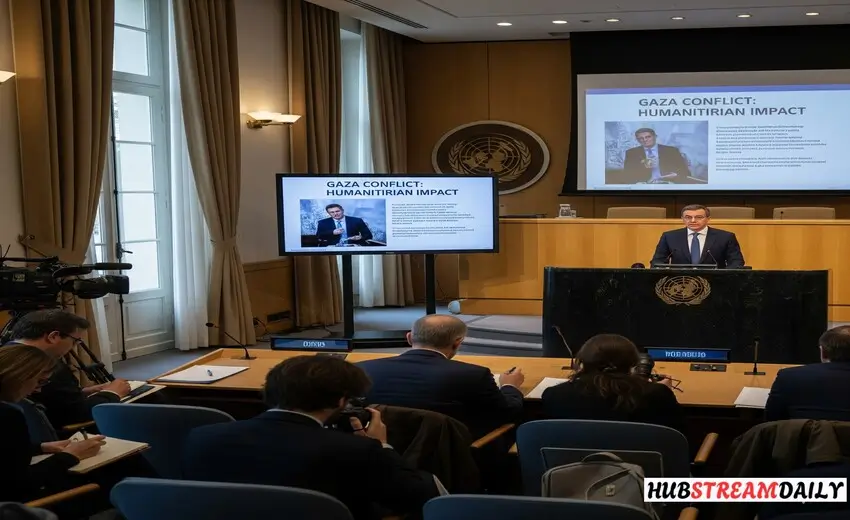
A shocking new report by the United Nations has revealed that North Korea has carried out executions of its own citizens for the “crime” of sharing and watching foreign films, television series, and music. The revelation sheds light on the reclusive state’s increasing paranoia over outside influence and its relentless efforts to control the flow of information. The findings provide a rare glimpse into the brutal consequences of what the international community would consider harmless entertainment but what the Kim Jong-un regime views as a threat to its ideological stranglehold.
The UN’s Findings
According to the UN’s Office of the High Commissioner for Human Rights (OHCHR), testimonies collected from North Korean defectors indicate that executions, imprisonment, and torture have been used as punishments for distributing or consuming foreign media. The report specifically highlights South Korean dramas, Western movies, and K-pop as primary targets of the regime’s wrath.
Witnesses described how individuals caught watching or smuggling such content were publicly executed — often in front of large crowds — as a means of instilling fear and reinforcing loyalty to the regime. The UN report accuses North Korea of systematically violating basic human rights and creating a climate of terror in order to suppress even the slightest deviation from state propaganda.
Why Entertainment is Seen as Dangerous
For most of the world, films and TV shows are sources of joy, culture, and escapism. But for Pyongyang, they represent a direct threat to its monopoly on truth. North Korea’s leaders fear that exposure to foreign lifestyles and democratic values could inspire dissent and weaken the carefully constructed myth of national superiority.
South Korean dramas, which depict modern lifestyles, freedoms, and prosperity, stand in stark contrast to the harsh realities of North Korean life. Western music and movies, meanwhile, are portrayed as “toxic influences” that poison the minds of citizens and undermine loyalty to the state.
In 2020, Kim Jong-un introduced the “Anti-Reactionary Thought Law,” which imposes severe penalties — including death — for those who consume or distribute foreign cultural products. This law is now being enforced with brutal consistency, according to the UN report.
Stories from Defectors
Defectors have long spoken about secret “media smuggling rings” that sneak in USB sticks, SD cards, and DVDs from China and South Korea. These often contain South Korean K-dramas, American movies, or even simple pop songs.
One defector told the UN that he witnessed classmates in his high school being executed for watching South Korean dramas. Another revealed that entire families were punished because one member was caught sharing foreign films. In some cases, people were sent to prison camps — where survival itself is a gamble — simply for owning a foreign DVD.
A chilling detail in the report mentions that students as young as teenagers were executed in front of their peers for “corrupting their minds with capitalist culture.” Such stories highlight how entertainment in North Korea is not just leisure — it’s a matter of life and death.
Public Executions as a Warning
The UN report reveals that executions are not carried out in secret but are deliberately staged in public spaces. Schools, factories, and marketplaces have served as stages for these grim performances, ensuring that fear spreads through society like wildfire.
By making people watch their neighbors or classmates being shot for watching a drama or listening to music, the government ensures that individuals police each other. The fear of collective punishment — where family members and even neighbors can be punished for one person’s “crime” — reinforces silence and obedience.
International Reactions
The revelations have sparked strong international condemnation. Human rights organizations have demanded accountability and called for North Korea to be held responsible for crimes against humanity.
The United States, South Korea, and several European nations have expressed outrage, with some urging the UN Security Council to take stronger action. However, North Korea’s close ties with China and Russia complicate global responses, as both countries have historically shielded Pyongyang from the harshest sanctions.
South Korea, in particular, has expressed concern, given that its cultural exports — dramas, films, and music — are directly targeted by Pyongyang’s censorship laws. Ironically, South Korean culture continues to be smuggled into North Korea despite the risks, underscoring the population’s hunger for information and entertainment beyond the regime’s propaganda.
The Growing Influence of South Korean Culture
In recent years, the global rise of K-pop and K-dramas has been nothing short of phenomenal. From BTS topping global charts to shows like Squid Game and Crash Landing on You dominating Netflix, South Korean cultural exports have shaped global entertainment trends.
Inside North Korea, however, these same shows are treated as weapons of subversion. Reports suggest that despite the dangers, many North Koreans secretly consume them, finding hope and inspiration in the stories of freedom, love, and prosperity.
The regime’s attempts to eliminate this influence ironically highlight its power. For many North Koreans, seeing South Korean lifestyles on screen reveals the gap between the state’s propaganda and reality, often sparking disillusionment with the regime.
Technology vs. Tyranny
North Korea’s leadership is engaged in a constant battle with technology. Despite heavy surveillance and draconian punishments, citizens still find ways to smuggle in and consume foreign media.
Portable storage devices — like USB sticks and microSD cards — have become lifelines of forbidden knowledge. Smugglers often risk their lives bringing them across the border from China. Once inside, these devices circulate through underground networks, passed from hand to hand in secrecy.
The government has responded with increasingly advanced surveillance, random home inspections, and surprise raids. Officials even check the TV sets and computers of ordinary households for unauthorized media. But despite these efforts, technology continues to outpace tyranny, making censorship an uphill battle.
Historical Parallels
The obsession with controlling information is not new. Totalitarian regimes throughout history — from Nazi Germany to Stalinist Soviet Union — have suppressed art, literature, and entertainment that challenged their authority.
But what makes North Korea unique is the extreme nature of its punishment for something as simple as watching a film. Where most regimes resorted to censorship, Pyongyang has chosen execution — a brutal escalation that has drawn comparisons to medieval practices.
Calls for Accountability
Human rights groups are pushing for stronger international action, including possible referral of North Korea to the International Criminal Court (ICC) for crimes against humanity.
The UN report highlights that the systematic use of fear, violence, and execution for cultural expression is not just a violation of human rights but also a form of state terror. However, achieving justice is complex. North Korea remains isolated, and its leadership rarely faces international scrutiny due to geopolitical divisions.
The Silent Resistance
Despite the risks, foreign media continues to spread inside North Korea. Underground networks are resilient, and many ordinary citizens risk their lives to access outside content. For them, entertainment is not just a pastime — it is a silent act of resistance, a way to imagine a different world and a better future.
One defector described watching a South Korean drama as a life-changing experience: “It was the first time I realized that people in other countries lived differently — they had choices, freedom, and dreams. It made me question everything I was told.”
Such stories underline why the regime is so afraid of foreign films and music: they open a window to truth.
At Last, The UN report paints a grim picture of life inside North Korea, where even the simplest pleasures — like watching a TV drama — can carry the death penalty. The regime’s brutality highlights its deep insecurity, relying on fear to maintain control in a rapidly changing world.
While international condemnation grows, the people of North Korea remain trapped in an environment where curiosity can be fatal, and imagination can be a crime. Yet the persistence of underground media circulation proves that no wall, however high, can completely block the human desire for freedom, knowledge, and hope.





